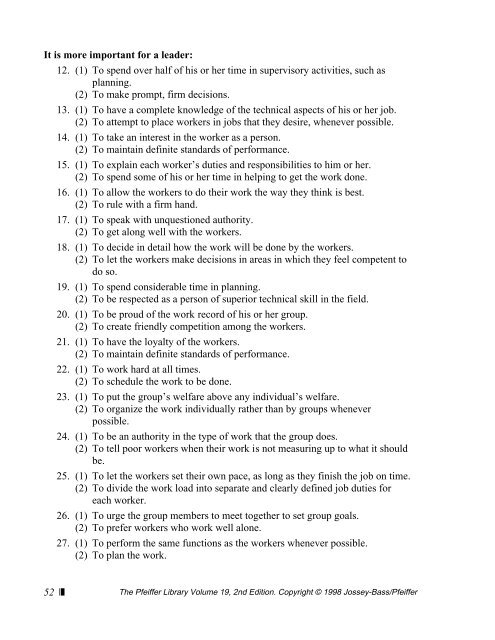motivational analysis of organizations
motivational analysis of organizations
motivational analysis of organizations
Create successful ePaper yourself
Turn your PDF publications into a flip-book with our unique Google optimized e-Paper software.
It is more important for a leader:<br />
12. (1) To spend over half <strong>of</strong> his or her time in supervisory activities, such as<br />
planning.<br />
(2) To make prompt, firm decisions.<br />
13. (1) To have a complete knowledge <strong>of</strong> the technical aspects <strong>of</strong> his or her job.<br />
(2) To attempt to place workers in jobs that they desire, whenever possible.<br />
14. (1) To take an interest in the worker as a person.<br />
(2) To maintain definite standards <strong>of</strong> performance.<br />
15. (1) To explain each worker’s duties and responsibilities to him or her.<br />
(2) To spend some <strong>of</strong> his or her time in helping to get the work done.<br />
16. (1) To allow the workers to do their work the way they think is best.<br />
(2) To rule with a firm hand.<br />
17. (1) To speak with unquestioned authority.<br />
(2) To get along well with the workers.<br />
18. (1) To decide in detail how the work will be done by the workers.<br />
(2) To let the workers make decisions in areas in which they feel competent to<br />
do so.<br />
19. (1) To spend considerable time in planning.<br />
(2) To be respected as a person <strong>of</strong> superior technical skill in the field.<br />
20. (1) To be proud <strong>of</strong> the work record <strong>of</strong> his or her group.<br />
(2) To create friendly competition among the workers.<br />
21. (1) To have the loyalty <strong>of</strong> the workers.<br />
(2) To maintain definite standards <strong>of</strong> performance.<br />
22. (1) To work hard at all times.<br />
(2) To schedule the work to be done.<br />
23. (1) To put the group’s welfare above any individual’s welfare.<br />
(2) To organize the work individually rather than by groups whenever<br />
possible.<br />
24. (1) To be an authority in the type <strong>of</strong> work that the group does.<br />
(2) To tell poor workers when their work is not measuring up to what it should<br />
be.<br />
25. (1) To let the workers set their own pace, as long as they finish the job on time.<br />
(2) To divide the work load into separate and clearly defined job duties for<br />
each worker.<br />
26. (1) To urge the group members to meet together to set group goals.<br />
(2) To prefer workers who work well alone.<br />
27. (1) To perform the same functions as the workers whenever possible.<br />
(2) To plan the work.<br />
52 ❘❚<br />
The Pfeiffer Library Volume 19, 2nd Edition. Copyright © 1998 Jossey-Bass/Pfeiffer

















